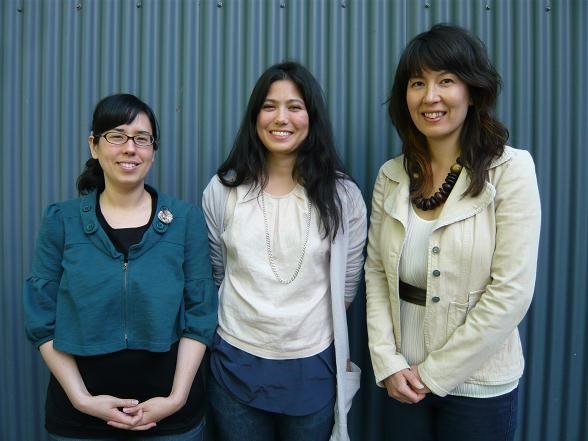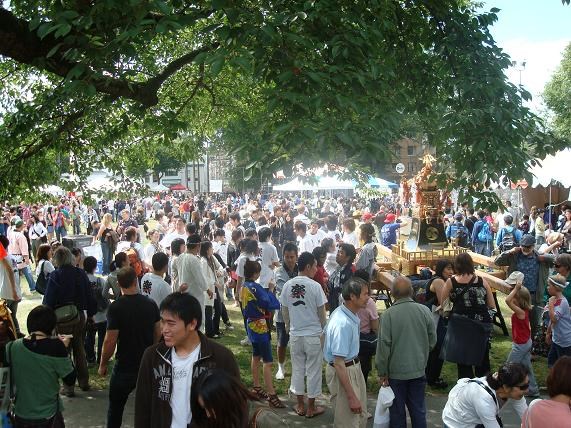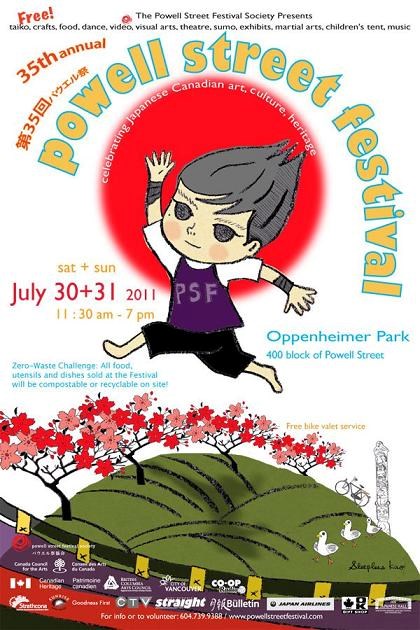If this year's summer hasn't exactly felt like summer, the coming BC Day long weekend always packs a lot of punch into the city: There's the fireworks, the Pride festival and the Powell Street Festival, this Saturday and Sunday at Oppenheimer Park, home of Vancouver's traditional Japantown. The PSF hits its' 35th annual mark this summer and is still the lower mainland's longest running community arts festival. Julia Aoki, who is no stranger to the pack, heads the crew this year as interim general & programming manager. She steps in to fill in for Kristen Lambertson's year away from the role which has Kristen working on some of the city's other big festivals. Before Kristen, Miko Hoffman held the festival down like a rock from 2003-2008. We spoke to these 3 past festival GM's on how they got involved with the festival and its' special place within Vancouver's many different communities.
The 35th Annual Powell Street Festival
Saturday, July 30th and Sunday, July 31st, 2011, 11:30am – 7:00pm
Oppenheimer Park - 400 block, Powell Street
Photos, vids from last year's fest

L-R: Miko Hoffman, Julia Aoki, Kristen Lambertson (photo: Boon Kondo)
Q: How did you all get involved with the festival?
Julia: My sister, Aretha, was on the board of directors and programming committee years ago. I remember visiting her while she was volunteering at the Children’s Tent during one Festival weekend, and after that becoming generally more aware of the Festival. When my sisters and I were children, our parents would file us into the Ford Granada, which we called ‘Old Blue,’ and we’d drive in from the suburbs to attend the festival; but between adolescence and adulthood, I had pretty much forgotten about it. Becoming involved with the Festival (first as a Volunteer Coordinator, then a committee and board member, now the Interim General Manager and Programming Director), happened partly at my sister’s insistence, partly due to the nostalgia I felt for the event, and partly due to the feeling that it was a safe and inclusive space to explore the idea of being Japanese Canadian.
My first year as Volunteer Coordinator I was struck by the kindness and generosity of a strong community of people: from board members and staff like Miko, Rika Moorhouse, John Yamazaki, Angus McLean, and many others, to the volunteers that return every year, like Kathy Shimizu, Cat Renay, Gweny Wong, Mary Spark, Gary Mah and Kevin Sleziak… the list goes on and, since that first year, it’s continued to grow. Besides the more obvious draw of the artistic programming and the delicious food, the Festival is a testament to the possibility of a collective and committed effort, and it’s really rewarding to be part of that.
Kristen: I actually first became involved in 2008. I had always heard about the Festival when I briefly lived in Vancouver for a few years before moving away, but had never attended. Yet I had been intrigued by its mixture of Japanese Canadian arts and culture, history and its unique relationship to the DTES community. Luckily it all came together when I moved back to Vancouver in 2008 and the opportunity arose to work with the Festival.
Miko: It's in my blood! My mom was involved from the very early years, and I grew up watching my mom perform taiko there, and when I was old enough to carry a tong, I was volunteering on garbage duty! And I guess I worked my way up, from garbage to the merch table, to coordinating the merch table, to coordinating the festival, to General Manager. And now I'm happy to be back as a volunteer.

Photo: Boon Kondo
Julia, how does it feel to be the festival GM/programming manager coming after your initial involvement with the festival?
Julia: I feel really lucky. I’ve had lots of time to get to know the organization—the way it functions and the many, many volunteers involved—since my first contract, and I’ve come to really love and respect it. So to work for the Festival at this level means I’m in the very rare position of working full time for something I believe is important. Arts and culture are too often treated like frivolous commodities that should thrive or perish in the open market. I think the Powell Street Festival is proof that arts and culture are worth cultivating and protecting because their value extends beyond the monetary. They can do really important things, like foster curiosity and the exploration of unfamiliar ideas, provide a stable environment and common understanding for a collective community, and even provide the means for respectfully disrupting and questioning that collective community. This might all sound hyperbolic or idyllic, but the Powell Street Festival has been all of these things for me.
Of course, there are struggles. There is a lot to this job, from writing grants and reports, to forecasting and keeping the budget, to making artist arrangements, and so on and so forth. All things that are not particularly glamorous, but integral to a non-profit arts organization. I’m learning much of this as I go, and I’ve been so fortunate to have the support of Kristen, Miko, the board, Diane (who we share the office with), and our lovely summer staff (Kazuho Yamamoto, Sabrina Furminger and Wentao Xue).
Julia, can you tell us about your graduate work on Oppenheimer Park?
Julia: I did my MA in Communication and Cultural Studies at York University, which I finished in 2009. Toward the end of my undergraduate degree I had already begun thinking about how the symbolic meaning of Oppenheimer Park shifts during the three days of the year (including the Friday set-up) that the Powell Street Festival takes place. During those three days, temporary structures are put up in, and a lot of resources are directed to the Park by institutions and community groups that operate under the collective banner of the Powell Street Festival. For those who are aware of JC history in the area (briefly, that it was where approximately half of all Japanese Canadians lived prior to the Second World War, and that, as with other Japanese Canadian communities, it was dismantled through racist legislation that led to mass dispossession and internment), it’s hard not to understand the temporary spatial presence of Japanese Canadians in the neighbourhood through that history.
So, roughly, I started to do my master’s work around the collective spatial practices that inscribe the Park with symbolic, historical meaning. As I began researching and writing, I expanded the scope to include a range of (often symbolically interconnected) historical and contemporary collective activities, from the labour rallies of the Wobblies (the Industrial Workers of the World) that were held in Oppenheimer, to the temporary tent city that was erected in the summer of 2008, to the Women’s Memorial March that takes place every year on Valentine’s Day and ends at the Memorial Pole in the Park. These practices and the histories they evoke are not widely known, and they aren’t integrated into broadly circulated histories of Vancouver—so in my work, I situated these practices against the production and reproduction of Vancouver through commercial imagery and narratives.
It’s a really small and (for many, I’m sure) seemingly insignificant Park space. But there is a lot of history there. The Powell Street Festival is involved with the Oppenheimer Park Commemorative Task Force, led by the City of Vancouver, and during my time working with the Task Force it quickly became apparent that there are a lot of stakeholders deeply committed to the future of the Park and the respectful treatment of the histories of that Park.
Kristen & Miko, what are you two involved in now after your PSF GM roles?
Miko: I'm currently on maternity leave from my position of Executive Director at Nikkei Centre. I'm looking forward to taking my 10-month old to her first PSF! And I'm the Sales Booth co-Coordinator as well as a director of the board.
Kristen: I've taken a year off from PSF to work on a one-year contract with the City of Vancouver. It's been great to see the inner workings of the City's granting system as well as help with the Summer Live Festival that the City put on in the beginning of July. I'm sure that my experience will come in handy down the road!
Kristen, you have studied and been involved in the arts community across Canada. What is unique about PSF and its place in Vancouver?
Kristen: PSF is indeed unique and I think that this contributes in part to its mass appeal. It's a really great example of being an arts and culture organization that is so culturally specific in its programming mandate, yet able to reach out and speak to such a wide and diverse audience. It's really quite amazing to see the diversity of people involved with the Festival as volunteers and as attendees. I can't speak to all festivals across the nation, but this one certainly is relevant and important to a wide-range of people across ages, ethnicities, genders, cultures and mind-sets. Set in the DTES, it has deep roots with both the Japanese Canadian heritage in the neighbourhood and contemporary connections with the communities that currently inhabit the area. The Festival is really a mix of culture, arts, history, fun, and festivity, set within an area of Vancouver that so often gets neglected or saddled with a bad reputation. The public perception is changing over time, but it still amazes to see the masses of people who flock to this part of town once a year in droves to get their share of takoyaki and taiko. The Festival is a kind of social glue--bringing people together.
The Society itself is also very interesting as it maintains a presence within the City year-round, programming the work of a range of talented Asian Canadian artists and curators. In addition to the artists and curators involved, it's also got a great number of dedicated members who are interested in supporting and nurturing the Festival and its activities. It's a very supportive community interested in pushing boundaries as well as respecting the past. You've really got to admire the people who have been involved in building this organization. They are an incredible group of talented, hard-working people who have managed to cultivate a Festival that both actively maintains its community roots and has evolved into a presenter of professional traditional and contemporary arts. The Powell Street Festival is a bridge that straddles communities and interests--giving rise to a cultural and social phenomenon all of its own.
Miko, you were also a past editor for Discorder mag, right? Can you tell us about that? The memories, etc...?
Miko: I was "editrix" for three years and it happened by accident! I was attending UBC and was the volunteer Programme Director and one day, the editor at the time ran down the hall screaming and he never came back! It was the summer, the radio station was pretty dead, and we all looked at each other ... and I don't know what possessed me, but I offered to help out until a permanent replacement was found. And I got reeled in. It was a great experience, and definitely acclimatized me to high pressure deadlines. Editing Nardwuar's columns was always a blast. I think I got less sleep during production weeks than I did when my baby was a newborn! I was known to sleep in the CiTR lounge on occasion instead of going home.
Julia, for those who have not heard of or not attended the PSF, how do you describe it personally?
Julia: It’s a two-day, Japanese Canadian cultural festival that happens every year on August long weekend (this year, this happens to fall on July 30th and 31st). All daytime events are free, which means it’s an opportunity to experience music, dance, visual and performing arts, without the usual expense. There is tremendous talent on display, from the taiko groups, to the traditional and contemporary dancers, folk and rock musicians, and martial artists. The food is delicious and affordable, and not your typical Vancouver/Japanese fare.
Julia, what's in store for the festival this year?
Julia: So much. Maybe it’s because it’s my first year, maybe it’s because it’s the 35th anniversary, but the schedule feels jam-packed.
On Friday, July 29th we launch the Festival with two events: the opening of Jeremy Isao Speier’s exhibition at BLIM (115 East Pender St) starts at 6:30pm, and a double bill music show featuring NikaSaya (Japan) and Goh Nakamura (San Francisco) starts at 8:00pm at Chapel Arts (304 Dunlevy). They’re in walking distance from each other, so the devoted can check out both.
Over the weekend, we present a commissioning (in partnership with the Cherry Blossom Festival) between Chibi Taiko and Aboriginal youth drumming group Spakwus Slulum. We also commissioned the Tashme Project, a play by Julie Tamiko Manning and Matt Miwa that is inspired by the oral histories of internment and resettlement gathered through a series of conversations across dinner tables. Dance group 605 Collective present a new work in which members move between the roles of choreographer and performer as they collectively explore questions of generational movement.
For our 35th anniversary, we will also be visited by artists from across Canada and Japan. –sei trio brings together Yuki Isami (Japan), Keiko Devaux (Quebec) and Vivien Nishi (BC) for a musical presentation that mixes traditional Japanese sounds with contemporary arrangements. The venerable emcee Nish Raawks joins us from Toronto for the second time. And we are very fortunate to be visited by Anesara Shine Upsor, an Ainu (Aboriginal people of northern Japan) group, who will perform traditional songs and dances.
Julia, any final shout outs as we head into the festival weekend?
Julia: There are so many... the incredible summer production team, the board of directors, the programming, advocacy and site committees, all the coordinators and volunteers, everyone who supports the festival through donations and attendance, our funders and sponsors.

Poster by Kaori Kasai


